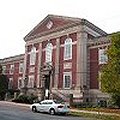- By Marcia E. Lynch
- News
 Print
Print  At a fact-finding session Tuesday, the County sought further suggestions from those interested in a proposed road preservation law that would amend the County Code to regulate certain heavy commercial or industrial uses of County roads with the potential road damage.
At a fact-finding session Tuesday, the County sought further suggestions from those interested in a proposed road preservation law that would amend the County Code to regulate certain heavy commercial or industrial uses of County roads with the potential road damage.The proposed amendment, first advanced and put to public hearing in January, then delayed to permit further work by the Legislature’s Government Operations and Facilities and Infrastructure Committees, would regulate temporary commercial or industrial activity generating “high frequency, high impact truck traffic.” The Chairs of those committees called the meeting to gather constructive suggestions to assist the County as it considers possible changes in the proposed local law.
County Administrator Joe Mareane noted the proposal recognizes that extraordinary burdens on local roads create extraordinary costs, seeks to fairly assess costs to those responsible for damage, and to give the policy the force of law, with the plan establishing weight, type, and frequency thresholds, and a system of permitting and bonding to cover potential damage for those who exceed those thresholds. The administrator said that staff has responded to prior input received by suggesting potential revisions, including increases in both frequency and weight limit that would require a permit. Other potential revisions would include the option of voluntary road use agreements as an alternative to the permitting process.
Among concerns expressed by those attending the meeting:
- That the revised thresholds (currently suggested as more than 40 truck trips per day for more than five days per week, by trucks exceeding a weight of 30 tons) be increased significantly, and that the limits be based on total trips related to a project, instead of frequency.
- That a more flexible system of thresholds be developed, that would vary based on the existing condition (classification) of roads, with such designations based on analysis of road system capacity considering such factors as time of year, frequency, and duration of traffic.
- That a road preservation law may not be needed—that regulation could be accomplished through the County’s existing regulation structure related to county highways.
- That analysis include recognition of potential sales tax benefits from commercial activity, including from the cost of materials.
Facilities and Infrastructure Chair Carol Chock was among those thanking those who attended for their valuable and ongoing input, noting that the process of determining a fair and workable approach to protecting the county’s roads is not easy. Legislator Dave McKenna, a member of the Government Operations Committee, added, “We need as much input as you can give us.”
v7i13



